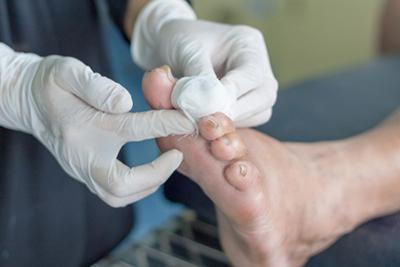
Receive diabetic wound care assistance in Fort Walton Beach, Crestview, and Niceville, FL, after consulting Dr. Cosimo Ricciardi and Dr. Neil Patel of Emerald Coast Podiatry.
Why Is Proper Foot Wound Care Essential for Diabetics?
Diabetes can cause plenty of troublesome complications. While slow wound healing may not seem that bad compared to other potential complications of having diabetes, it can still significantly affect your quality of life. Incomplete wound healing is especially troublesome because it can lead to the development of diabetic foot ulcers.
For those unfamiliar with diabetic foot ulcers, these are wounds that form due to a combination of excessive foot pressure, trauma, deformities, and certain symptoms associated with diabetes. Those symptoms include slow wound healing, the loss of feeling in your feet, and poor circulation.
Because your ability to perceive sensations in your feet has been dramatically diminished by diabetes, you may not realize that you already have open wounds. As those wounds worsen, they can increase your chances of infection.
Although pain may not be a primary concern for individuals with diabetic foot ulcers, they can still cause numerous problems. Going outside may be difficult because you must avoid exposing your foot ulcer to foreign materials. Your shoes and socks may also be stained with the blood coming from your wounds.
Unfortunately, those are still far from the most concerning complications caused by diabetic foot ulcers. If you fail to address those injuries in time, they may become infected to the point where amputation is necessary. You may lose a foot because you failed to care for your wounds properly.
You can schedule your diabetic wound care consultations with Dr. Ricciardi of Emerald Coast Podiatry in Fort Walton Beach, Crestview, and Niceville, FL.
How Do You Prevent Diabetic Foot Ulcers?
Now that we know why proper wound care is essential for diabetic feet, we can discuss how you can avoid foot ulcers.
You can start by reevaluating your footwear. If your shoes are putting too much pressure on certain parts of your feet, change them. Talk to a podiatrist to determine which shoes you should be wearing.
Individuals with diabetes should also regularly inspect their feet. Reserve time daily to inspect your feet thoroughly and search for any wounds.
Changing your diet may also be necessary. Switch to a diet that can lower blood sugar and improve circulation. Stay on that diet long-term to improve your rate of wound healing.
Lastly, don’t hesitate to arrange an appointment with a podiatrist if you have a foot wound. Seek treatment immediately to prevent that wound from growing.
Call 850-862-4119 or 850-682-6522 to reach Dr. Ricciardi and Dr. Patel of Emerald Coast Podiatry and schedule your wound care sessions in Fort Walton Beach, Crestview, and Niceville, FL.